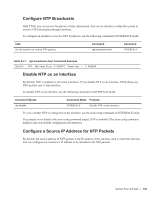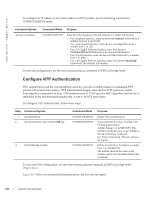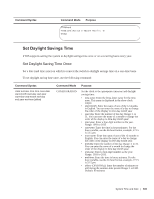Dell Force10 MXL Blade MXL 10/40GbE Switch IO Module Configuration Guide - Page 604
stratum 2 and greater secondary reference this is the four-octet Internet address of the peer
 |
View all Dell Force10 MXL Blade manuals
Add to My Manuals
Save this manual to your list of manuals |
Page 604 highlights
www.dell.com | support.dell.com • Leap Indicator (sys.leap, peer.leap, pkt.leap): This is a two-bit code warning of an impending leap second to be inserted in the NTP time scale. The bits are set before 23:59 on the day of insertion and reset after 00:00 on the following day. This causes the number of seconds (rollover interval) in the day of insertion to be increased or decreased by one. In the case of primary servers, the bits are set by operator intervention, while in the case of secondary servers, the bits are set by the protocol. The two bits, bit 0 and bit 1, respectively, are coded as follows: • Poll Interval: integer indicating the minimum interval between transmitted messages, in seconds as a power of two. For instance, a value of six indicates a minimum interval of 64 seconds. • Precision: integer indicating the precision of the various clocks, in seconds to the nearest power of two. The value must be rounded to the next larger power of two; for instance, a 50-Hz (20 ms) or 60-Hz (16.67ms) power-frequency clock would be assigned the value -5 (31.25 ms), while a 1000-Hz (1 ms) crystal-controlled clock would be assigned the value -9 (1.95 ms). • Root Delay (sys.rootdelay, peer.rootdelay, pkt.rootdelay): This is a signed fixed-point number indicating the total roundtrip delay to the primary reference source at the root of the synchronization subnet, in seconds. Note that this variable can take on both positive and negative values, depending on clock precision and skew. • Root Dispersion (sys.rootdispersion, peer.rootdispersion, pkt.rootdispersion): This is a signed fixed-point number indicating the maximum error relative to the primary reference source at the root of the synchronization subnet, in seconds. Only positive values greater than zero are possible. • Reference Clock Identifier (sys.refid, peer.refid, pkt.refid): This is a 32-bit code identifying the particular reference clock. In the case of stratum 0 (unspecified) or stratum 1 (primary reference source), this is a four-octet, left-justified, zero-padded ASCII string, for example, the case of stratum 2 and greater (secondary reference) this is the four-octet Internet address of the peer selected for synchronization. • Reference Timestamp (sys.reftime, peer.reftime, pkt.reftime): This is the local time, in timestamp format, when the local clock was last updated. If the local clock has never been synchronized, the value is zero. • Originate Timestamp: The departure time on the server of its last NTP message. If the server becomes unreachable, the value is set to zero. • Receive Timestamp: The arrival time on the client of the last NTP message from the server. If the server becomes unreachable, the value is set to zero. • Transmit Timestamp: The departure time on the server of the current NTP message from the sender. • Filter dispersion: The error in calculating the minimum delay from a set of sample data from a peer. 602 | System Time and Date















